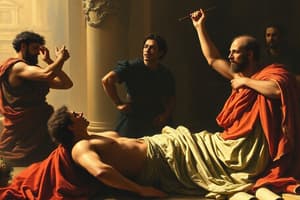Podcast
Questions and Answers
What is Tintinius' immediate reaction upon discovering Cassius' death?
What is Tintinius' immediate reaction upon discovering Cassius' death?
- He looks for Pindarus to celebrate.
- He reassures Messala about their plans.
- He mourns and feels responsible for Cassius' fate. (correct)
- He expresses joy over their victory.
Which metaphor does Tintinius use to describe the setting sun?
Which metaphor does Tintinius use to describe the setting sun?
- The sun brings hope for the future.
- The sun will rise again for Rome.
- The setting sun mirrors Cassius' demise. (correct)
- The sun of Rome is shining bright.
What does Messala intend to do after finding Tintinius?
What does Messala intend to do after finding Tintinius?
- To celebrate their supposed victory.
- To inform Brutus about Cassius' death. (correct)
- To seek counsel from Pindarus.
- To fight the enemy.
How does Brutus react to the death of Cassius?
How does Brutus react to the death of Cassius?
What does Tintinius do before he kills himself?
What does Tintinius do before he kills himself?
What emotion does Messala attribute to the misinterpretation of events surrounding Cassius?
What emotion does Messala attribute to the misinterpretation of events surrounding Cassius?
What command does Brutus give regarding Cassius' body?
What command does Brutus give regarding Cassius' body?
What does Brutus imply about the state of their fight against the enemy after Cassius' death?
What does Brutus imply about the state of their fight against the enemy after Cassius' death?
What is Cassius's reaction upon realizing the enemy's proximity?
What is Cassius's reaction upon realizing the enemy's proximity?
What task does Cassius assign to Tintinius?
What task does Cassius assign to Tintinius?
What does Cassius ask Pindarus to verify from his vantage point?
What does Cassius ask Pindarus to verify from his vantage point?
What does Cassius mean by saying, 'My life is run his compass'?
What does Cassius mean by saying, 'My life is run his compass'?
What motivates Cassius to ultimately decide to take his own life?
What motivates Cassius to ultimately decide to take his own life?
How does Pindarus initially react to Cassius's orders?
How does Pindarus initially react to Cassius's orders?
What symbolic act does Cassius perform with his sword?
What symbolic act does Cassius perform with his sword?
What does Pindarus intend to do after Cassius’s death?
What does Pindarus intend to do after Cassius’s death?
What does Tintinius believe about the outcome of the battle before discovering Cassius's fate?
What does Tintinius believe about the outcome of the battle before discovering Cassius's fate?
What does Tintinius use the garland for in relation to Cassius?
What does Tintinius use the garland for in relation to Cassius?
How does Tintinius express his grief following Cassius's death?
How does Tintinius express his grief following Cassius's death?
What phrase does Brutus use to imply the emotional turmoil following Cassius’s death?
What phrase does Brutus use to imply the emotional turmoil following Cassius’s death?
What does Tintinius mean by 'thou never comest unto a happy birth' in his lament?
What does Tintinius mean by 'thou never comest unto a happy birth' in his lament?
What fate does Tintinius choose for himself after realizing Cassius is dead?
What fate does Tintinius choose for himself after realizing Cassius is dead?
What does Messala intend to do with the news of Cassius's death?
What does Messala intend to do with the news of Cassius's death?
What does Brutus say about finding Cassius's body and why is it significant?
What does Brutus say about finding Cassius's body and why is it significant?
What does Cassius mean when he says, 'O, coward that I am, to live so long, to see my best friend ta'en before my face'?
What does Cassius mean when he says, 'O, coward that I am, to live so long, to see my best friend ta'en before my face'?
How does Tintinius demonstrate loyalty to Cassius in this scene?
How does Tintinius demonstrate loyalty to Cassius in this scene?
What leads Cassius to take his own life?
What leads Cassius to take his own life?
What is the significance of the phrase 'this day I breathed first: time is come round'?
What is the significance of the phrase 'this day I breathed first: time is come round'?
How does Pindarus react to Cassius's dying wish?
How does Pindarus react to Cassius's dying wish?
What does Cassius’s instruction to Pindarus reveal about his state of mind?
What does Cassius’s instruction to Pindarus reveal about his state of mind?
Why does Cassius inquire about the fire in 'my tents'?
Why does Cassius inquire about the fire in 'my tents'?
What does 'the sword that kill'd thee' symbolize in Cassius's final moments?
What does 'the sword that kill'd thee' symbolize in Cassius's final moments?
Flashcards are hidden until you start studying
Study Notes
Antony's Victory
- Brutus gives the order to attack Octavius too early, giving the opposing forces a strategic advantage.
- Cassius' soldiers are distracted by looting, leaving them vulnerable to Antony's forces.
- Cassius retreats to a hill, concerned about the presence of opposing forces in his camp.
Cassius' Death
- Cassius requests a thorough reconnaissance of the battlefield.
- He gives Pindarus instructions to spy on Tintinius to discover whether the approaching troops are allies or enemies.
- Cassius is devastated when he learns that his friend, Tintinius, has been captured.
- Overwhelmed by despair, Cassius asks Pindarus to kill him, using Caesar's sword, and Pindarus complies.
Messala's News
- Messala and Tintinius encounter each other, having both been in separate battles.
- Messala informs Tintinius of Brutus' victory over Octavius, but also of Cassius' defeat.
- Messala discovers Cassius' body on the hill.
Tintinius' Grief and Death
- Upon finding Cassius’ body, Tintinius is deeply saddened, believing Cassius has committed suicide due to a perceived lack of success.
- Tintinius mourns Cassius, expressing deep respect for his friend and lamenting his loss.
- He places a crown of victory brought to him by his allies on Cassius’ head.
- Tintinius, overwhelmed by sorrow, kills himself.
Brutus' Reaction and Plans
- Brutus is devastated by the deaths of Cassius and Tintinius.
- He reflects on his own failures and acknowledges the power of Caesar's legacy.
- Brutus makes plans to send Cassius' body to Thasos for its funeral.
- He prepares for another battle against Octavius and Antony, believing he can still succeed.
Cassius' Despair and Death
- Cassius, convinced of defeat, flees with his friend, Tintinius.
- Cassius mistakes a fire in his own tents for enemy presence.
- He asks Tintinius to scout out troops and sends Pindarus to watch for him.
- While waiting for news, Cassius becomes suicidal as he feels his life has run its course.
- He fears Tintinius has been captured and requests Pindarus to kill him, using Caesar's sword as a final act of revenge.
- Pindarus kills Cassius and flees the country, vowing to live far from any Romans.
Tintinius' Misguided Loyalty
- Tintinius, unaware of Brutus' victory, returns to Cassius with news of Octavius' defeat.
- He finds Cassius dead and laments his loss, seeing it as a consequence of his own mistaken belief in Cassius' defeat.
- He misinterprets his victory wreath as a sign of Cassius' victory, crowning the dead general with it before taking his own life.
The Impact of Cassius' Death
- Brutus and Messala arrive to find Cassius and Tintinius dead.
- Brutus is deeply saddened by Cassius' demise and acknowledges Caesar's enduring power.
- Brutus, heartbroken, orders Cassius' body to be sent to Thasos, away from the camp to avoid demoralizing the troops.
- He declares his intention to honor Cassius' memory and prepare for another battle.
Studying That Suits You
Use AI to generate personalized quizzes and flashcards to suit your learning preferences.




